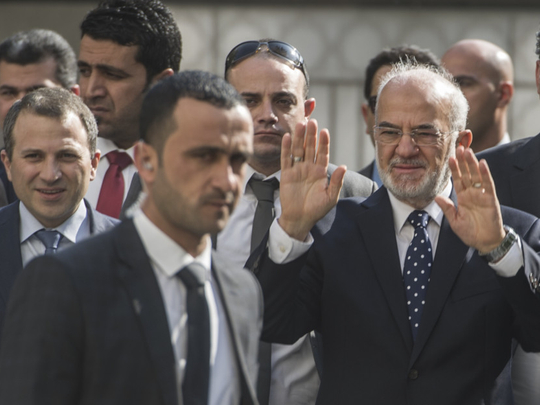
Beirut: In one of his more memorable declarations recently, Lebanese Minister of Foreign Affairs, Gebran Bassil, delivered a mixed message at Sunday’s League of Arab States (LAS) meeting in Cairo. He reiterated Lebanon’s solidarity with Saudi Arabia against the attacks on its diplomatic missions in Iran, while he discarded the portion of the League statement that linked Hezbollah to acts of terrorism in Bahrain.
Coming on the heels of an equally determined Gulf Cooperation Council gathering in Riyadh on Saturday, when GCC Foreign Ministers unanimously condemned Iran for authorising attacks on the Saudi embassy in Tehran and the Saudi consulate in Mashhad, the LAS vote was significant too. The strong backing illustrated Riyadh was in the driver’s seat, despite what critics said, setting the agenda for a nascent Arab leadership role.
The position highlighted Lebanon’s internal schizophrenia, reflected by its politically polarised society, as Bassil backed Riyadh against the attacks on its missions while also claiming that events occurred “outside of the state’s consent”.
He also objected to a statement inserted in the final communique of the meeting which criticised Hezbollah as a terrorist organisation.
“Lebanon cannot accept linking Hezbollah to terrorism because it is a party represented in the government and parliament,” he said, adding that Lebanon had taken a decision to distance itself from the spat between Saudi Arabia and Iran.
Last Wednesday, Manama announced that it had dismantled a “terror” cell linked to Iran’s Revolutionary Guard and Lebanon’s Hezbollah. The cell was allegedly planning to carry out a “series of dangerous bombings” in Bahrain. Bassil refuted these allegations. Saudi Arabia and other Arab countries have long complained of Iranian interference in their internal affairs, which was highlighted during Sunday’s emergency meeting in Cairo.
An example of this interference is Hezbollah’s fighting alongside Syrian regime forces and helping to prop up President Bashar Al Assad.
The schizophrenic tendencies of Lebanese foreign policy are clearly reflected by this juxtaposition. On the one hand, it wants to distance itself from the Saudi-Iran fallout, while on the other hand Hezbollah is heavily involving itself in the Syrian conflict.












